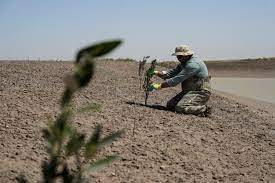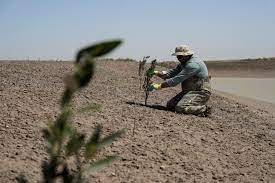As Iraqi Ayman Al-Rubaie plants mangrove saplings (Qurm) in the expansive clay plains of southern Iraq, the black smoke rising in the distance behind him illustrates the environmental damage that the man is striving to heal. Al-Rubaie, an agricultural engineer, is working on a project initiated by Iraqi government agencies and a United Nations body to plant up to four million mangrove trees in the marshlands of Al-Zubair, located near large oil fields. While leaning to plant one seedling and moving to another, the mud covers his shoes up to the ankles. Al-Rubaie hopes that what he is doing will be part of what will become a mangrove forest protecting the coast, providing a habitat for endangered species, and combating climate change. He stated, "Mangrove plants fight climate change," referring to these trees' ability to absorb and store carbon dioxide.
According to the World Bank, carbon dioxide emissions in Iraq have more than doubled over the past decade, making it one of the worst polluters in the region when measured against the size of the country's economy. The expansive clay plains south of Basra are a landscape of water, salt, mud, and foggy skies, crisscrossed by canals through which Al-Rubaie and his team navigate by boat. Smoke rises into the air from a petrochemical plant near the Al-Zubair oil field, about 20 kilometers away, which is part of the massive energy sector providing most of Iraq's income, and is also the primary and polluting industry in the Basra region.
Southern Iraq was once known for its rich wetlands, which have been drained for decades in an environmental disaster that led to the destruction of a complex ecosystem and the death of many species that lived there. Planting mangrove trees in the extensive clay plains, south of where the wetlands once existed, can protect coastal residents from storms and flooding while providing a new habitat for endangered species without using any of Iraq's scarce freshwater for irrigation.
The plan was inspired by successful mangrove restoration projects in neighboring Kuwait and the United Arab Emirates across the Gulf. Al-Rubaie, with his Iraqi accent, said mangrove plants can "withstand the harsh conditions we are going through," pointing out the potential to restore vegetation innovatively, without relying "on the amounts of water that need to be introduced, irrigation water, which has led to the use of plants that can live on the coasts." Mangrove trees thrive in hot, muddy, and salty conditions—an environment unsuitable for most other plants. Ahmed Bajaj, from the World Food Programme, which is working on the project with the local Basra government, the city university, and the Iraqi Ministry of Environment, revealed that the new trees come from a nursery growing 12,000 seedlings.




